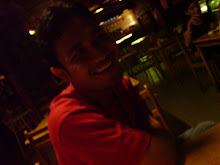
She gives me love, love, love, love, crazy love
Let me free so that like the Sun I shall wear a robe of fire, and within that fire like a Sun to adorn the world







PULAU PINANG 9 Ogos – Ahli Parlimen Jelutong, Jeff Ooi tidak akan meminta maaf berhubung kenyataannya yang mengaitkan syariah Islam dan Jamaah Islah Malaysia (JIM) sebagai ekstremis sebaliknya hanya mahu menarik balik kenyataan tersebut.
Menurut Ooi, tindakan menarik balik kenyataannya itu dibuat atas nasihat Ketua Menteri Pulau Pinang, Lim Guan Eng yang mahu beliau berbuat demikian.
Justeru katanya yang juga Ketua Staf Pejabat Guan Eng, sebagai seorang yang bekerja sepertinya dan mempunyai ketua, dia perlu mengikut nasihat dan arahan yang diberikan ketua walaupun mempunyai pandangan lain.
‘‘Sebagai sebuah pertubuhan yang berdaftar dan entiti awam, JIM juga seharusnya tidak mudah terasa hati dengan kenyataan peribadi yang dikeluarkan oleh orang ramai berkaitan misi dan aktivitinya.
‘‘JIM patut menerima segala kenyataan yang dikeluarkan tidak kira dalam bentuk yang bagaimana kerana semua orang berhak mengeluarkan pandangan peribadi masing-masing,’’ katanya pada sidang akhbar di Pusat Khidmat DAP Parlimen Jelutong di Jalan Perak di sini hari ini.
Menurut Ooi, beliau juga mencabar pihak-pihak tertentu yang mendakwanya sebagai anti-Islam supaya memberikan bukti kukuh terhadap perbuatannya yang menunjukkan dia berbuat demikian.
Katanya, beliau tidak teragak-agak untuk mengambil tindakan undang-undang terhadap pihak yang terus menuduhnya.
Sementara itu, Ooi juga mahu Ahli Majlis Perbandaran Pulau Pinang (MPPP), Mohd. Razali Abdullah, yang juga ahli JIM keluar daripada Majlis Jawatankuasa One Stop Centre (MJOSC) kerana beliau hanya satu beban politik kepada kerajaan negeri.
Katanya, tindakan Mohd. Razali yang telah menangguhkan projek dua pemaju yang tersenarai dalam Bursa Malaysia hanya kerana syarat dan permintaan ‘peribadinya’ tidak termaktub dalam garis panduan dan kriteria sedia ada tidak dipenuhi, hanya satu tindakan merugikan semua pihak.
Menurut beliau, permohonan Kebenaran Merancang (KM) telah ditangguhkan walaupun kedua-dua pemaju itu telah memperoleh surat kelulusan daripada semua jabatan-jabatan teknikal yang terlibat.
‘‘Dalam mesyuarat MJOSC yang diadakan, beliau telah mempersoalkan dan meminta maklumat berkaitan harga jualan rumah, meminta gambar perspektif 3D, pindaan pelan dan maklumat pelan induk terdahulu, sedangkan pelan itu telah diluluskan sebelum itu.
‘‘Ini semua tidak berasas dan bukannya merupakan aspek teknikal yang berada dalam bidang kuasa MJOSC. Tindakannya itu hanya akan menimbulkan keresahan, kegelisahan dan ketakutan kepada pemaju. Jangan bila mereka sudah keluar dan tidak ingin melabur di negeri ini, baru kita mahu mengambil tindakan terhadap Mohd. Razali. Ini sudah terlambat,’’ katanya.
Bagaimanapun, Ooi berkata, beliau tidak akan campur tangan dan menyerahkan kepada kerajaan negeri untuk tindakan selanjutnya terhadap Mohd. Razali.
Namun, kata Ooi, dia akan mengumpulkan segala bukti yang ada untuk menunjukkan ‘tindakan’ keterlaluan dan tidak berasas Mohd. Razali itu untuk diserahkan kepada Guan Eng.
‘‘Tidak seharusnya Mohd. Razali dibiarkan terus berada dalam MJOSC, dia harus keluar untuk menjamin pelabur terus berminat melabur di Pulau Pinang,’’ katanya.
Dalam pada itu, ketika ditanya pemberita, adakah beliau akan meletakkan jawatannya disebabkan isu yang timbul tersebut, Ooi berkata, isu mengenai jawatannya itu tidak penting sebaliknya yang paling utama kini adalah jawatan Yang Dipertua MPPP.
Menurut beliau, jawatan itu kini dipangku Setiausaha Kerajaan Negeri, Datuk Zainal Rahim Seman setelah penyandangnya, Tan Cheng Chui menghadapi masalah kesihatan.
‘‘Cheng Chui sekarang sedang sakit dan desas desus ada mengatakan dia akan meletakkan jawatan. Ketiadaannya menyebabkan banyak mesyuarat MJOSC terpaksa ditangguhkan yang bermakna banyak projek juga terpaksa ditangguhkan kerana kita tidak ada alternatif pengerusi.
‘‘Datuk Zainal mempunyai banyak tugas lain. Dia tidak mungkin mampu melaksanakan semua tugas. Oleh itu satu perancangan teliti perlu dilakukan untuk menjamin ekonomi negara terus berkembang,’’ katanya.

Jumaat, 31 Julai 2009, yang lalu, kami warga pendidik Sosiologi and Antropologi Universiti Islam Antarabangsa Malaysia (UIAM) telah menerima kunjungan hormat seorang sarjana dari Akademi Kepimpinan Qatar (Qatar Leadership Academy), Doha, Qatar. Sarjana dimaksudkan ialah Dr. Khalid Mohammed Muftah.

Berdiri dari kiri ke kanan: Dr. Rohaiza Rokis, Prof. Dr. Jamil Farooqui, Prof. Dr. Ahmad Abd al-Rahim Muhammad Nasr, Prof. Dr. Mohamed Aris Haji Othman, Prof. Madya Dr. Hazizan Md. Noon, Dr. Noor Azlan Mohd Noor, Nurazzura Mohamad Diah, dan aku (orang Oman celup :P)
Duduk dari kiri ke kanan: Dr. Badri Najib Zubir, Dr. Khalid Mohammed Muftah dan Dr. Pute Rahimah Makol-Abdul

Lama tidak menjenguk. Sudah bersawang agaknya. Keadaan yang tidak begitu mengizinkan. Terlalu sibuk dengan kerja, conference, persediaan untuk menjadi tetamu orang, dan pelbagai lagi. Ditambah dengan ribut yang melanda famili. Kasihanku pada Harith. Sedihku pada Afiqah. Mereka masih tidak mengerti. Melihatnya terbujur kaku. Sejuk. Pun begitu aku masih bersyukur, kerna Tuhan masih memberi kesempatan pada kami untuk masih lagi bertemu dengan si ibu. Sesungguhnya Tuhan lebih mengetahui......















